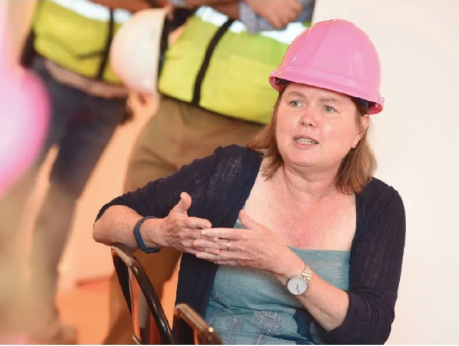Cal Hedigan is the first female CEO of Community Access, a Manhattan-based nonprofit, providing housing and supportive services to New Yorkers who live with mental health concerns.
Hedigan has dedicated her career to creating environments where people living with mental health concerns can live with dignity, access connection and community and find allies who will support them in their journeys.
Here she shared with us her insights on Community Access’ work and mission, as well as her own journey.
Tell us a little about Community Access and why it is important.
Community Access is one of the pioneers of supportive housing in NYC for people living with mental health concerns who have experienced homelessness. For nearly 50 years, the organization has led mental health and housing campaigns to address homelessness. We believe that housing is a human right, and through our work, we ensure that some of the most vulnerable New Yorkers can access affordable housing, connect with support when they need it and have a fresh start in life. Unfortunately, a disproportionate number of people living with mental health concerns are in the shelter system, and senior citizens and working families struggle with housing insecurity, given the severe lack of affordable housing.
This is a crisis for our city, and the numbers are only increasing: 50,000 individuals and families, including over 15,000 children, are in the shelter system every night. The COVID-19 pandemic, which has had a spiraling effect on job loss and so many other painful outcomes, is only making matters worse. As an agency dedicated to developing affordable and supportive housing, our efforts are part of the solution to this housing crisis, and I’m proud to say that we currently have nearly 1,000 units of housing in the pipeline, with more to come.
What made you interested in Community Access?
I first learned about Community Access while I was working for the Bowery Residents’ Committee (BRC) in the early 1990’s. At the outset, I was drawn to Community Access’ rights-based approach to mental health work. We’re not here making decisions for the people we serve. Rather, our purpose is to provide supports along the way to help people live with dignity in community settings.
The values that Community Access stands for have always resonated with me and have kept me here for over 20 years. I am moved by the dedication of our staff, who work tirelessly to support tenants and program participants, especially during this prolonged public health crisis.
In this pandemic moment, one hears stories of people re-evaluating their work lives and wondering – is this how I should be spending my time? For me, the answer to that question has always been and continues to be a resounding yes.
Can you tell us about your journey and your various roles that led you to become the first female CEO of Community Access?
I began my work in the field of mental health in 1985 at the Richmond Fellowship in the UK, a non-hierarchical model where staff and participants live and work together in community. I moved to New York in 1988 and built on this experience – working in shelter-based and residential mental health programs in case manager, intake coordinator and director and planning roles.
I first joined Community Access in 1999 as the director of policy and program evaluation and later moved into many other positions within the agency, including chief operating officer and deputy CEO. My focus has always been on our rights-based approach to the work and building systems to ensure that we live our mission every day.
I was deeply honored in 2019 when the board of directors selected me to become the new chief executive officer. And, while I started this position shortly before the pandemic changed the world in a myriad of ways, I remain more passionate than ever about our mission and values.
Can you tell us more about the values and goals that drive Community Access?
Foremost, we believe in self-determination: people are experts in their own lives and know what they need. In our housing programs, we take what is called a “Housing First” approach. That means that our door is open – people don’t need to have solved all of their problems before they get to have a stable place to live. Housing is an essential first step that helps people have a sense of stability and the opportunity to think about other areas of their lives. We work as partners to help tenants pursue whatever goals they want in life—whether that is accessing housing, building social connections, finding health care, pursuing an education, adopting a pet, finding a job or whatever else is important to them. We’re here to be an ally.
So many of our participants have been negatively impacted by the pervasive stigma surrounding mental health, homelessness and incarceration. We work to break down barriers that prevent too many people from achieving their goals.
A big part of challenging stigma is recognizing that people’s life experiences have value. As an employer, Community Access is unique in that we strive to hire 51% staff, at all levels, who have lived mental health experiences. Beyond our own hiring, we also are proud of our Howie the Harp Peer Advocacy Center (HTH) in Harlem, a workforce model that has become the gold standard in training and a leading pipeline for other NYC agencies looking to add peer expertise to their workforces.
How can our readers help Community Access carry out its mission?
Making a charitable donation is one of the best ways to help us, which people can do by visiting our website: communityaccess.org/donate.
Folks should follow us on social media to keep tabs on what we’re doing, upcoming events, and how they can be involved in our work. We’re @CommunityAccess on Facebook, @ca_nyc on Twitter and @CommunityAccessinc on Instagram.
We are also looking for caring community members to join our board of directors and be a partner with us in helping to end homelessness in NYC. We are fortunate to have a dedicated group of board members who include professionals in real estate, health care, mental health and a variety of other fields, who volunteer their time and expertise to help us fulfill our mission. Among them is Dan Wurtzel (president of FirstService Residential NY) who Mann About Town readers may already know.
What are your hopes for the future of Community Access?
NYC is experiencing record rates of homelessness amid the ongoing public health crisis. I hope that more individuals, companies and foundations will continue to step up to invest in our critical mental health and housing work, which matters so much to all of New York City.
One of the very few silver linings I have gleaned from the COVID-19 experience is the willingness of people to discuss their own mental health struggles. I am hopeful that this important conversation will grow, and that we all will continue to recognize our common humanity.








